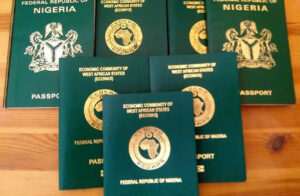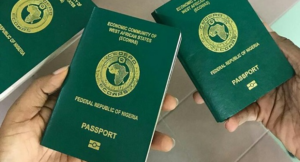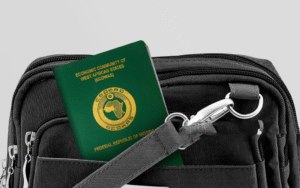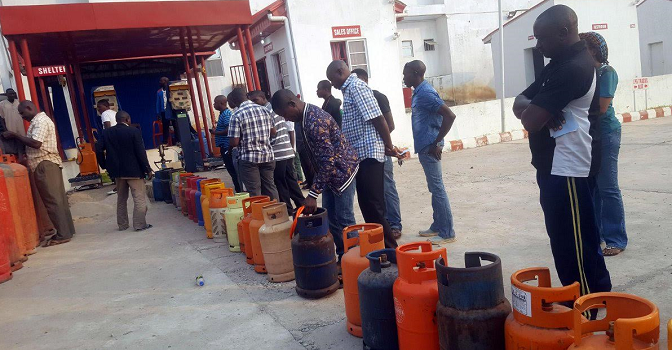
FG Raises Passport Fees to N100,000, N200,000 Effective Sept 1
- Nigeria News
- 29.08.2025
- No Comment
- 390
FG Raises Passport Fees to N100,000, N200,000 Effective Sept 1
September 1. Under the revised schedule, the standard 32-page e-passport will now cost
N100,000, while the 64-page booklet will cost N200,000. Authorities say
the adjustment reflects rising production and security costs and is part of a broader effort to modernize identity management,
curb fraud, and accelerate processing timelines nationwide and in the diaspora.

11:59 p.m. on August 31. New payments or resubmissions on/after September 1 will be charged at the updated rates.
What’s Changing on September 1
| Booklet Type | Pages | New Fee (₦) | Applies To |
|---|---|---|---|
| Standard e-Passport | 32 | 100,000 | Fresh & Renewal |
| Standard e-Passport | 64 | 200,000 | Fresh & Renewal |
The fee adjustment applies to new applications, renewals, reissues (e.g., damaged, lost, or exhausted pages),
and change-of-data requests that require a new booklet. The government says the prices incorporate enhanced
biometric security, upgraded public key infrastructure (PKI), and expanded
anti-counterfeit features in line with global standards for machine-readable travel documents.
Officials cite sustained currency depreciation, higher costs for polycarbonate substrates, biometric chips, security inks,
personalization machinery, and global licensing fees. They argue that subsidized pricing left the system vulnerable to
backlogs, equipment downtime, and dependence on emergency procurement.
The fee hike is tied to commitments on faster capture appointments, tighter SLA targets, and real-time status tracking.
Authorities also tout ongoing end-to-end digitization, geo-address validation for applicants, and
integration with national identity databases to reduce duplication and fraud.
- Complete pending applications immediately: If you’ve started an application under the previous fee,
ensure payment confirmation and document submission are finalized before August 31 to keep the old rate. - Book capture early: Even after payment, capture slots can be scarce in high-demand centres. Use official
portals only; avoid third-party “agents.” - Verify booklet type: Choose 32-page if you travel infrequently; opt for
64-page if you travel often to avoid multiple renewals. - Check your NIN details: Ensure your National Identification Number (NIN) data (names, DOB, phone, email)
exactly matches your passport application to prevent delays. - For diaspora applicants: Confirm the new USD/GBP/EUR equivalents and centre-specific logistics fees with
your local mission; exchange-rate movements can affect final checkout amounts.

and SME owners who shuttle between markets. For some, the upfront cost may delay travel plans or force a switch to the
32-page booklet. Travel consultants anticipate a short-term rush before September 1, followed by a lull as households
re-budget for the increased fees.
Education counsellors also expect tighter timelines: scholarship winners and postgraduate admits may need to start
passport processes earlier to absorb the higher cost and avoid last-minute premium services. Export-oriented SMEs,
meanwhile, may prefer the 64-page booklet despite the price, given frequent visas and entry stamps.
- Queue transparency: Numbered, auditable queues and SMS/email notifications for capture and pickup.
- Cashless policy: Card or verified transfer payments on official portals to reduce cash handling risks.
- Audit trails: Every application step logged with time-stamps to deter racketeering.
- Whistleblower channels: Anonymous hotlines for reporting bribery, diversion, or fake “express” offers.
- Stronger identity vetting: Harmonized NIN–passport records and watch-list checks to protect document integrity.
at current exchange rates. However, affordability must be viewed against local incomes. Critics argue that even if the
technology inputs mirror global peers, fee shocks should be phased or paired with targeted reliefs for vulnerable groups,
much like student concessions or low-income waivers seen in some countries.
secure passport system. Detractors say the timing is insensitive amid a high cost-of-living squeeze and call for
transparent service-level guarantees for example, a refund or fee credit if issuance exceeds a stated SLA without a
valid security reason.

Civil society groups propose additional safeguards: publishing issuance timelines by centre; quarterly dashboards on
complaints and resolution; and independent mystery-shopper audits to discourage informal fees. Some have urged the
government to ring-fence a portion of the revenue for customer support upgrades and staff training.
Frequently Asked Questions
When does the new fee take effect?
September 1. Applications fully paid and submitted before 11:59 p.m. August 31 remain on the old rates.
Are there concessions?
Authorities have not announced blanket waivers. Any humanitarian or diplomatic exemptions typically follow extant policy
and must be processed through official channels.
Does “express” service cost more?
Where available, expedited processing may attract an additional official charge. Beware of unofficial “express” offers by
middlemen use only the government portal and receipts.
Will issuance be faster after the increase?
The government links the hike to improved throughput, fewer stock-outs, and better customer support. Applicants should still
apply early especially during peak travel periods.
What to Watch After September 1
- Real SLA performance: Capture lead times, average issuance days, and backlog clearance rates.
- Supply stability: Consistent availability of booklets and personalization consumables.
- Transparency: Published metrics and clear complaint-resolution pathways.
- Enforcement: Disciplinary action against staff or agents engaged in extortion or diversion.
Ultimately, the policy will be judged by outcomes: fewer queues, predictable timelines, and zero tolerance for
racketeering. If those are achieved, public acceptance is likely to grow despite the higher headline price.
Applicants are advised to rely solely on official communication channels and to keep all digital







